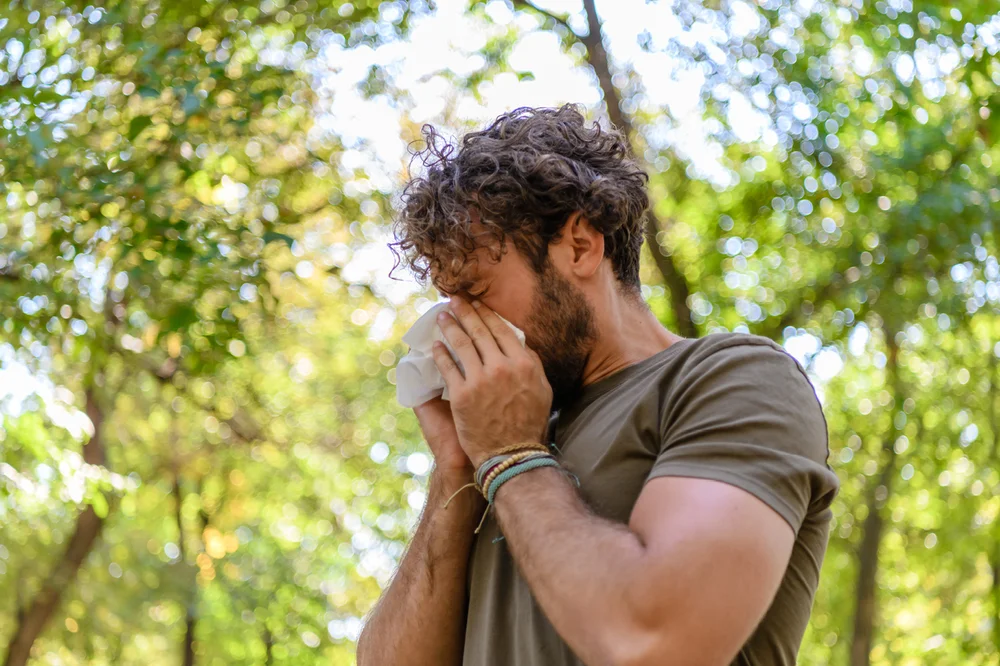6 of the Best Tips for Natural Allergy Relief
The first bright, sunny days of spring can feel glorious after the dark, cold days of winter – unless you suffer from seasonal allergies.
Watery eyes, sneezing, coughing, chest congestion, a runny or stuffy nose – symptoms of seasonal allergies can make this time of year awful for many people. About 25% of adults suffer from seasonal allergies, and roughly 19% of kids.
Skin allergies (eczema) and food allergies are no fun either.
Fortunately, for a number of minor allergy symptoms, a natural remedy may be all you need.
Here are some top ways to find natural allergy relief!
6 of the Best Tips to Provide Natural Allergy Relief
- Nasal Rinse
Saline nasal irrigation (also called nasal rinsing) is an easy and simple way to wash irritating allergens such as pollen, mold, dirt, dust, or pet dander out of your nasal passageway to help relieve the symptoms of allergic rhinitis (sneezing, itchiness, and a blocked or runny nose).
A meta-analysis of 10 studies found that nasal rinsing significantly reduced medicine consumption (more than 60%) while helping to clear congestion more than 30% faster, and thus recommended it as complementary therapy for allergic rhinitis.
Using a neti pot or squeeze bottle, you can wash your sinuses with a homemade or store-bought saline/water solution. Be sure to include only sterilized water – either by using distilled water or boiling (and cooling) tap water.
- Use an Air Filter
Indoor air can have a two to five times higher concentration of certain pollutants than outdoor air, according to the Environmental Protection Agency (EPA). Use an air filter in your home and/or office to trap and remove common indoor air particulates known to trigger allergies (such as pollen, dust, mold, dust mites, and cockroach and pet dander).
A couple of small studies indicate the efficacy of HEPA filters in removing air particulates. In one study, participants with rhinitis allergy symptoms subjectively reported improvement.
- Try Acupuncture
Acupuncture is known to have immune-stimulating, calming, and anti-inflammatory effects, which can all be beneficial in addressing seasonal allergies.
Many studies have revealed promising results using acupuncture to help with seasonal allergy symptoms such as nasal congestion, sneezing, runny nose, coughing, and itchy eyes, nose, and throat – although more conclusive research is needed.
One review of 13 studies found acupuncture led to “a significant reduction in nasal symptom scores” concluding that acupuncture could be a safe and valid treatment option for those with rhinitis symptoms.
A 2022 review of 30 studies found that acupuncture helped with nasal symptoms (compared to no acupuncture and sham acupuncture, a type of placebo) and had the same effects as certain allergy medications.
- Use Essential Oils
There are several essential oils – peppermint, lavender, sandalwood, frankincense, and eucalyptus – that can be helpful during allergy season. They can be inhaled using a diffuser or, when combined with a carrier oil, topically on affected areas of the skin.
Peppermint oil’s anti-inflammatory properties may potentially be helpful in reducing allergic respiratory symptoms as well as nasal congestion, some preliminary research indicates.
Lavender oil has calming properties that may help to quell allergic inflammation in the bronchial airways and on the skin.
Results from a 2016 study indicate the combination of frankincense and sandalwood might be helpful in calming nasal inflammation.
Known for its antimicrobial properties, a little eucalyptus oil added to laundry helps to minimize microbes that can play a role in skin allergies.
- Take Herbal & Nutritional Supplements
Among herbal remedies, stinging nettle (Urtica dioica) is believed by some to be one of the most effective for relieving allergy symptoms such as sneezing, runny nose, and itchy eyes. Limited research has indicated it has anti-inflammatory properties and potential histamine-inhibiting effects.
Another herb, butterbur (Petasites hybridus), may help to calm itchy, irritated eyes related to allergies, according to one review study. Additionally, a 2021 Swiss study found butterbur leaf extract effective in calming inflammatory and allergic rhinitis symptoms.
Research is uncovering the effects vitamin D has on immune actions involved in the development and course of allergies. Correcting vitamin D deficiency may possibly be helpful in protecting against respiratory, skin, and food allergies. As roughly 42% of adults and more than 50% of children are vitamin D deficient, this is an important supplement to take to bolster immune function and possibly protect against allergies.
Gut health is intricately linked with immune health and can play a role in minimizing allergy symptoms. Several studies sh
ow probiotic supplementation may be beneficial, especially for children suffering from allergies affecting airways and nasal passages. Consuming foods such as kefir, yogurt, kimchi, and sauerkraut offer another way to get more beneficial bacteria into your system.
Other nutritional supplements to try include vitamin C as it acts as a natural antihistamine, which can help calm allergic symptoms; omega-3 fatty acids as they may reduce the production of inflammatory chemicals in the body, which have a role in allergies and can help to calm allergic skin reactions; and quercetin, an antioxidant (found in foods such as apples, berries, and red grapes) as it’s also a natural antihistamine and may be helpful in skin, nose, and airway allergies.
- Sleep, Diet, and Exercise
Although not remedies, your lifestyle affects allergies too. Lack of sleep can weaken your immune system and increase inflammation in the body – as can a diet of unhealthy fats, high sugar, and refined carbohydrates, as well as excessive alcohol consumption. Maintaining a healthy immune system and keeping inflammation levels in the body in a normal range are important to minimizing allergies.
Exercise has been shown to decrease allergic reactions – although it isn’t entirely clear why. Some natural health experts suggest it has to do with blood flow. Exercise boosts blood flow, which may help to flush allergens more quickly out of the body and reduce inflammation caused by them. But don’t exercise outdoors when pollen counts are high!
Consult Your Doctor
Remember, it’s always a good idea to discuss natural allergy remedies with your doctor first as they do come with minor risks for certain people.
At BrainMD, we’re dedicated to providing the highest purity nutrients to improve your physical health and overall well-being. For more information about our full list of brain healthy supplements, please visit us at BrainMD.
- Here Are Some of the Best Tension Release Exercises to Help You Feel Your Best! - April 17, 2024
- Foodscaping: How to Grow Healthy Foods In Your Own Garden! - April 12, 2024
- Eat Your Fruits and Veggies (Don’t Drink Them) - March 29, 2024





I really enjoyed this article. Thank you